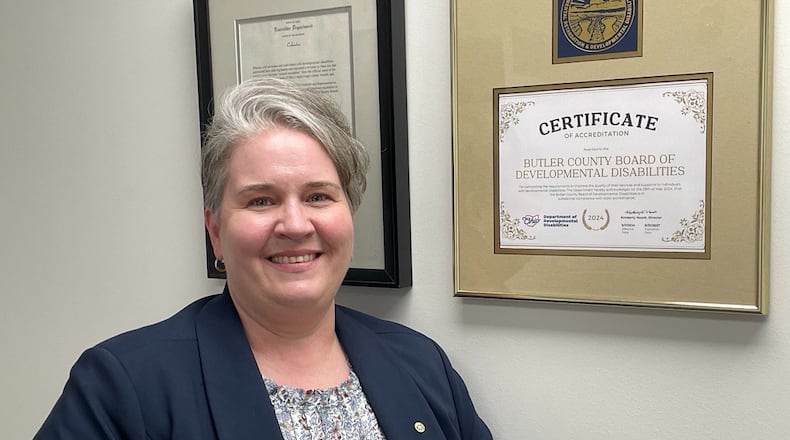“For me personally, it was a professional goal of mine,” said Emmons, who started as the Butler County Board of Developmental Disabilities superintendent on May 1. “I was looking for more opportunities to develop my leadership skills, which is kind of why I went to U.C.”
Emmons worked at the Butler County agency from 2008 to 2021. She had completed a lot of professional training, including an Ohio executive development program designed for future superintendents, as well as leadership training, and finished a master’s degree. She left Butler County to run a program at the University of Cincinnati’s Intellectual and Developmental Disability Education Center.
“When I first reached out, I thought, ‘It will be a good experience to interview and get my name on the radar,’” she said.
Emmons has been helping those with developmental and intellectual disabilities in various capacities for the past 25-plus years, and being the Butler County superintendent allows her to continue to make an impact.
The Butler County Board of Developmental Disabilities is the seventh-largest agency in Ohio, serving more than 4,100 residents, and nearly 67% of those people are 21 and younger.
“It’s really a priority to me that we’re supporting individuals and their families, and our provider community, and our staff. I just really wanted to continue of doing that good work of putting our people who we serve first.”
Emmons was one of several candidates for the job, and a search started with the vetting process by Ohio Association of County Boards Superintendent Search Advisor John Trunk. A search committee narrowed the field further before candidates were interviewed by the entire seven-member board.
“One of the qualities that Lee Ann Emmons brings to the board is her strong personal and professional commitment and passion for improving the quality of life of the people we serve as well as for supporting their families in this journey for full inclusion,” said BCDD Board President Rioja Velarde.
Emmons succeeds Lisa Guliano as the Butler County Board of Developmental Disabilities’ superintendent, who retired from the position after 11-1/2 years. She said she’s confident in Emmons’ abilities to “lead this organization with excellence and continue the very important work that is done here every single day.”
Funding will be a challenge for the Butler County Board of Developmental Disabilities. It receives 78% of its funding through a pair of continuing levies, both last passed about a generation ago (20 and 24 years). The agency’s remaining revenues come from federal funds, and some of those funds, like Medicaid, require a local match, so eventually, Emmons said, they’ll need to seek new levies from voters.
In 2023, the Butler County Board of Developmental Disabilities received $29 million in total revenues and spent just more than $28.98 million.
Some of Emmons’ goals in leading the Butler County Board of Developmental Disabilities include continuing to further the education and empowerment of those in the agency’s self-advocacy group, including getting the people they serve into leadership roles. This includes having a person served by the agency on the board, which is part of a state mandate Emmons is excited about “because I think we have to have that voice at the table.”
Butler County Board of Developmental Disabilities hasn’t had direct services, with the exception of some of the early intervention with those birth to 3 years old, since around 2017. But the agency will need to be able to support a trend that’s growing across the state and country.
“The trends right now are increased referrals in the youth population with dual diagnosis,” she said, saying these are kids with a developmental disability and usually mental health concerns. “We’re going to have challenges with that. There just aren’t enough resources.”
But the demographics will change: years ago, the population saw more children with Down syndrome, cerebral palsy and other types of intellectual liabilities. Now, she said, there are more diagnoses of autism and ADHD, and kids with dual diagnoses.
“We’ve been working hard to bring our staff back up after the pandemic to make sure they’re responsive and accessible, so we do have a hybrid work option that we’re really out there again supporting people as they need to be supported,” she said.
About the Author

